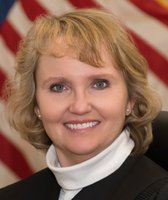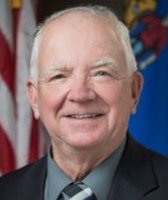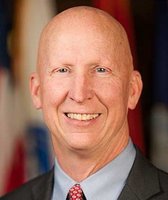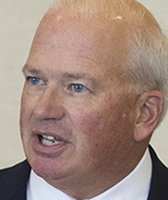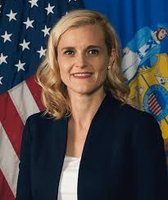Get PolitiFact in your inbox.
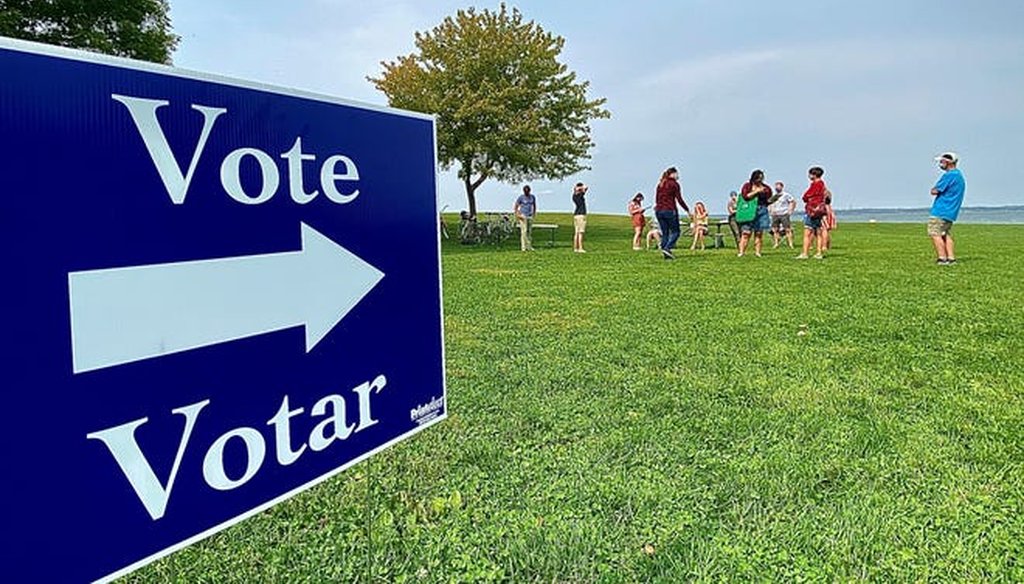
Voters turn in their absentee ballots to poll workers at James Madison Park in Madison on Sept. 27, 2020. (Photo by Elizabeth Beyer/Wisconsin State Journal)
If Your Time is short
- “Democracy in the Park” was a unique event that doesn’t perfectly align with any existing statutes that govern early voting or absentee ballots. That leaves the legality a somewhat open question until a court weighs in directly or the Legislature passes a law to specifically allow or disallow it.
- Republicans say the events were illegal, since they don't fit the allowed vote collections defined in statute
- Madison and the state elections commission say the events were allowed since no ballots were given out, meaning the actions aren't explicitly banned in the statute.
Facing an unprecedented influx of absentee ballots during a presidential election in the middle of a pandemic, the Madison clerk came up with a novel idea. Instead of making voters come to them, they’d go to the voters.
"It was an invention of necessity," said Madison City Attorney Michael Haas. "City Clerk Maribeth Witzel-Behl thought of the idea while she was walking her dog and thinking about the absentee ballot challenges. There was a record number of absentee ballots issued and there were well publicized concerns about (U.S. Postal Service) delivery of ballots. The last straw was that the secure drop boxes ordered by the City were delayed by a couple of weeks."
The result was "Democracy in the Park," a pair of events Sept. 26 and Oct. 3, 2020, where more than 17,000 voters dropped off absentee ballots at stations set up in Madison’s 206 city parks. The events were staffed by poll workers who had either worked in the past or were scheduled to work the Nov. 3 election, each of whom was sworn in as an election inspector.
No ballots were distributed at the event. Voters submitted absentee ballots they previously received through the standard application process.
The event has generated renewed debate as Republican lawmakers pursue legislation that would bar such initiatives in the future, among a litany of other election law changes.
Republicans have objected to the Madison effort as being contrary to state law, both as the events were occurring and — especially — after Democrat Joe Biden narrowly defeated Republican President Donald Trump in Wisconsin. Madison is a Democratic stronghold, which favored Biden over Trump by a margin of 136,000 to 23,000 in November.
"Harvesting ballots in the park went above and beyond state law," Senate Majority Leader Devin LeMahieu, R-Oostburg, said in a Jan. 15, 2021, appearance on PBS Wisconsin’s "Here & Now."
Fellow state Sen. Duey Stroebel — a Cedarburg Republican who is pushing a slate of election reform bills — included the event on a list of purported election problems in a March 7, 2021, appearance on WISN-TV’s "UpFront" program.
He said the city of Madison ignored statutory timelines by "voting early when they had no legal right to do so." One element of his proposal would effectively ban "Democracy in the Park" from occurring outside the existing two-week window for early voting.
It’s a tricky topic to fact check since there’s some disagreement between experts, and two lawsuits addressing the matter haven’t generated particularly clear rulings — though in both cases the input weighs in favor of the events being legal.
With the debate over "Democracy in the Park" likely to continue, this merits a closer look, even though we’ll stop short of assigning a rating in this case.
LeMahieu isn’t alone drawing a line between the events and the idea of ballot harvesting, so that’s a good place to start our analysis.
Ballot harvesting — also called ballot collection, which is a less loaded term — generally refers to the practice of a third-party returning an absentee ballot after the voter fills it out, signs it and performs any other required action. This practice is explicitly allowed in 26 states and limited in 12 states, according to the National Conference of State Legislatures.
Wisconsin is among the remaining states where statute does not directly address ballot collection, as Meagan Wolfe, head of the Wisconsin Elections Commission, noted in a March 2019 memo. Republicans still contend the practice is illegal under current statute, however.
Barry Burden, director of the Elections Research Center at the University of Wisconsin, said the event doesn’t match the definition of ballot harvesting or ballot collection.
"I don't see the park events as ‘harvesting’ by private parties because they were locations where election workers operating on behalf of the clerk allowed people to return ballots in person as permitted by law," he said.
Haas, who previously worked at the state election agency for 12 years and served as the state’s chief election official when the elections commission was first formed, agreed.
"’Ballot harvesting’ is usually thought of as campaigns or other organizations systematically collecting ballots from voters who support a particular candidate," said Haas. "That is different than Democracy in the Park, which was an official city-sponsored event, and involved sworn election officials, who could be from both political parties, collecting ballots in plain view of observers and then securing those ballots in sealed bags for delivery to the municipal clerk."
He added, "The practice of individuals returning ballots of other voters has existed as long as I can remember."
Adam Gibbs, a spokesman for LeMahieu, pointed to Wisconsin statute 6.87(4)(b)1 in backing LeMahieu’s description of the events as ballot harvesting. It states, "The envelope shall be mailed by the elector, or delivered in person, to the municipal clerk issuing the ballot or ballots."
Gibbs said any ballots not delivered directly to clerks would violate this requirement. Of course, ballots on Election Day aren’t handed directly to clerks either — they are typically submitted to poll workers.
The key question, though, isn’t whether the event matches a given definition, it’s whether it was legal. And the statute comes back into play in that broader discussion, which we’ll get to shortly.
Stroebel’s criticism comports the events with early voting, but there’s a key difference between the two.
Early voting in Wisconsin refers to in-person absentee voting, where voters can come in person to the clerk’s office to apply for an absentee ballot, fill it out and return it all at once. Specific dates and times for this vary by municipality, but state statute says it can’t take place more than two weeks before an election.
But that’s not what happened in the Madison parks. No ballots were given out. The voters were dropping off ballots they had previously applied for and received. They could bring ballots that had already been witnessed, or have the election workers on hand serve as witnesses.
Witzel-Behl, the clerk, said the poll workers in parks amounted to having "human drop boxes" around the city.
"The park locations were not designated as alternate voting sites or early voting locations because no ballots were issued in the parks," said Burden, the UW professor. "The October 20 start date for early voting is thus irrelevant; voters had been legally receiving and returning absentee ballots since mid-September."
This is the core contention by Republicans, and it’s the trickiest element to parse.
We’ll start with the court cases.
The Wisconsin Supreme Court ruled 4-3 on Dec. 14, 2020, against challenges to the state election results filed by President Donald Trump’s campaign. The majority declined to wade into the topic, noting Trump’s campaign hadn’t challenged the legality at the time the events occurred: "The time to challenge election policies such as these is not after all ballots have been cast and the votes tallied," the opinion said. Two members of that majority, Brian Hagedorn and Ann Bradley, said in concurring opinions they believed the events were valid, but the other two members of the majority did not weigh in. The three members of the minority said "Democracy in the Park" was improper.
So we can guess how the court might rule on the matter, but that ruling never happened.
We should note, however, that the Supreme Court ruled here to uphold a lower court ruling in which the judge clearly backed "Democracy in the Park." In a Dec. 11, 2020, ruling, Racine County Reserve Judge Stephen Simanek said the event was "simply an extension to allow a voter to deliver a completed ballot in a socially-distanced way. It certainly is an appropriate and correct interpretation of law to allow that to happen."
Another lawsuit filed by voters who supported the Madison event asked a Dane County judge to rule the event was permissible. That case was dismissed in October when no Republicans joined the case to oppose the motion. Without opposing parties, there was no controversy on which to rule, the judge said in dismissing the case.
That leaves us with an array of opinions. Here’s what we heard from people in various positions on the legality question.
Saying the events were illegal:
-
Marge Bostelmann, a Republican appointee to the Wisconsin Elections Commission who previously spent 24 years as the Green Lake County Clerk, pointed to the statute cited by Gibbs, which says ballots "shall be mailed by the elector, or delivered in person, to the municipal clerk." Since the poll workers accepting the ballots were sworn in as election inspectors, not deputy clerks, the event "doesn’t fall within statute," Bostelmann said.
-
Attorney Misha Tseytlin, in a Sept. 25, 2020, letter to the Madison clerk on behalf of Republican legislative leaders, said state statute details how voters can return ballots by mail, in person at the clerk’s office, at an early-voting location, in a drop box or at the polling place on Election Day. He said the "Democracy in the Park" "appears to fall outside of these lawful categories." The letter does not cite any statutes the event violated, however, and Tseytlin did not detail any after Haas asked him to do so in his response letter the next day.
-
Gibbs, backing LeMahieu’s statement, said the events violated state law because they weren’t designated as alternate voting sites under statute 6.855(5). However, that statute refers to early voting sites where voters can also receive ballots, which as we’ve noted didn’t happen here. Gibbs also asserted the events violated a prohibition on poll workers engaging in political activity, saying President Joe Biden’s campaign promoted the events in ads, "making the events political."
Saying the events were legal:
-
Wolfe, the head of the elections commission, said the events were allowed because no ballots were issued there. "For a voter to be able to return their ballots or have opportunities to witness their ballot, those are not prohibited under the law," Wolfe told reporters during a media call.
-
Haas, responding to Bostelmann’s assertion above, said, "We interpreted that provision, and the (elections commission) agreed, to mean the ballot could be delivered in person to the clerk, but it does not require personal delivery of the ballot to be only by the voter. The statute says ‘mailed by the elector, or delivered in person’ so ‘by the elector’ applies to mailing but not delivering in person." He said in another email, "The fact is that the statute does not define what it means to return a ballot ‘in person, to the municipal clerk.’"
-
Burden said the events "were innovative but appear to be legal. Voters returned the ballots to the clerk via paid workers who were operating on behalf of her office. The park events were merely opportunities for voters who already had ballots to return them to the clerk's office via election workers." We’ll note that according to Haas, poll workers had the option to be paid for the events, but some declined it.
-
Ken Mayer, a professor of American politics at the University of Wisconsin, said, "Seems to me the plain reading of the statute is that it was fine because there were no ballots issued. The only thing that happened is people turned in their absentee ballots. … The notion that this is unambiguously illegal, that’s just false."
So we have several court decisions, including a Supreme Court majority that declined to rule on the Madison events specifically but upheld a lower court ruling inwhich a judge backed the events' legality.
Republican lawmakers, their attorney and a Republican appointee to the elections commission say the events violated state law. The group supporting the legitimacy of the event includes the state’s top elections official, the Madison city attorney (a former state elections official who signed off on the event in the first place), and political experts from the University of Wisconsin-Madison.
So we’re short of a consensus or an authoritative ruling that makes us comfortable assigning a rating to these claims.
"Democracy in the Park" was a unique event that doesn’t perfectly align with any existing statutes that govern early voting or absentee ballots. That leaves the legality a somewhat open question until a court weighs in directly or the Legislature passes a law to specifically allow or disallow it.
Our Sources
WISN-TV, UPFRONT recap: Republicans propose changes to election laws, March 7, 2021
PBS Wisconsin, Here & Now for January 15, 2021, Jan. 15, 2021
Milwaukee Journal Sentinel, Republican lawmakers seek to overhaul voting in Wisconsin, including new rules for absentee ballots, Feb. 22, 2021
Milwaukee Journal Sentinel, Conservatives seek ban on ballot harvesting ahead of Wisconsin elections, June 8, 2020
Milwaukee Journal Sentinel, Wisconsin Supreme Court upholds Biden's win, rejects Trump lawsuit, Dec. 14, 2020
The Washington Post, What is ballot ‘harvesting,’ and why is Trump so against it?, May 26, 2020
National Conference of State Legislatures, VOPP: Table 10: Who Can Collect and Return an Absentee Ballot Other Than the Voter, Feb. 14, 2021
Wisconsin Elections Commission, Memo: Commission Legislative Agenda, March 11, 2019
Wisconsin state statute, 6.87(4)(b)1
Wisconsin state statute, 6.855(5).
Wisconsin Elections Commission, I want to vote absentee FAQ, accessed March 8, 2021
Spectrum News 1, GOP Threatens to Sue Over Madison Park Ballot Drop-Off, Sept. 27, 2020
Wisconsin Supreme Court ruling, Trump campaign lawsuit over election results, Dec. 14, 2020
Wisconsin State Journal, Lawsuit over Democracy in the Park ends with no decision, Oct. 24, 2020
Wisconsin State Journal, State elections official: Democracy in the Park doesn't appear to violate law, Oct. 2, 2020
Republican legislative leaders, attorney email to city of Madison, Sept. 25, 2020
Michael Haas, Madison city attorney, response to Republican letter, Sept. 26, 2020
Email exchange with Barry Burden, director of the Elections Research Center at the University of Wisconsin, Feb. 25-26, 2021
Interview with Ken Mayer, professor of American politics at the University of Wisconsin, Feb. 26, 2021
Email exchange with Michael Haas, Madison city attorney, Feb. 25-March 1, 2021
Email exchange with Adam Gibb, Jan. 19-20, 2021
Interview with Marge Bostelmann, Wisconsin Elections Commission board member, March 1, 2021
Hearing in Milwaukee, WI 12/10/20, Dec. 11, 2021














